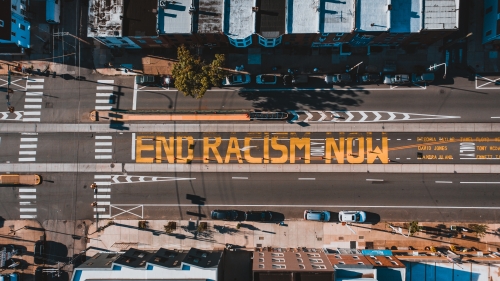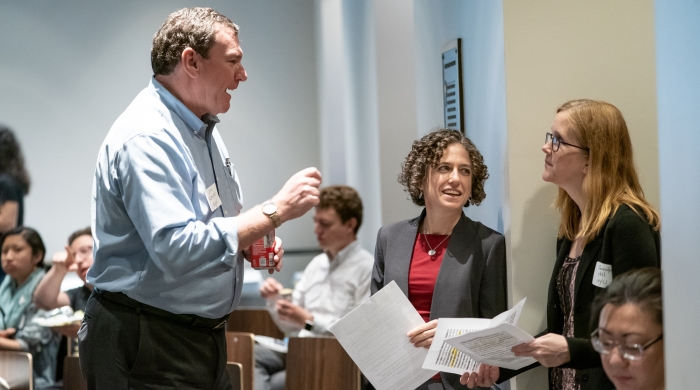
IHDSC Seed Awards enable faculty to engage in research projects with a demonstrated commitment to interdisciplinary perspectives that seek to unravel inequality and expand opportunities to increase social impact. This year, we partnered with NYU’s Cross-Cutting Initiative on Inequality to fund proposals that center the voices and knowledge of community stakeholders, feature research teams that include early-career investigators, BIPOC investigators, and/or investigators new to IHDSC or NYU, and integrate collaboration and partnership. Our 2021-2022 awardees, their research teams, and project summaries are listed below.
Identifying Scalable and Cost-effective Approaches to Improving Parenting Practices for Young Children in Developing Settings
Over the past three decades, a series of studies has shown that providing mothers in developing countries with guidance on how to offer psychosocial stimulation can improve the cognitive and social-emotional outcomes of their young children over the short-, medium-, and long-term. The ways in which this guidance has been provided are costly and challenging to take to scale. The present study will examine an alternative and potentially more cost-effective approach by delivering the intervention by phone. This strategy has the added benefit of ensuring that mothers continue to receive this valuable advice during the ongoing pandemic, which has often interrupted the operations of anganwadi (childcare) centers. We plan to train frontline workers in public anganwadis to offer this program to mothers too. The study will take place in the Indian states of Uttar Pradesh and/or Uttarakhand.
PI: Dr. Alejandro Ganimian, Assistant Professor of Applied Psychology and Economics, NYU Applied Psychology
Co-PI: Dr. Irma Arteaga, Associate Professor, University of Missouri
Co-I: Dr. Andreas de Barros, Postdoctoral Associate, Massachusetts Institute of Technology
Implementing Partner: Sneha Sheth, Co-founder and CEO, Dost Education
Partner: Dost Education
Counteracting Xenophobia and Trauma Through Linguistic Activism and YPAR: Toward an Anti-Oppressive Language and Literacy Pedagogy for/with Immigrant Youth
Over the past few years, xenophobic attacks on immigrants have ramped up, and immigrant youth suffer from xenophobia and racism on a regular basis, which impacts their learning, well-being, and identity. Designed as a case study of a participatory pedagogical exploration in one U.S. English language arts (ELA) classroom, this project uses multiple methods to explore how an intergenerational research collective of educators, students, activists, and researchers, formed through a research-practice partnership between NYU and the Internationals Network of Public Schools, can support immigrant youth to engage in critical inquiry and linguistic activism to counteract xenophobia and racism. Specifically, this project examines how the ELA teacher and university-based researchers, through collaborative practitioner research, co-create a language curriculum on immigration, inequality, and inquiry. Drawing on knowledge collectively generated from the research, this project aims to build a theory of anti-oppressive language and literacy pedagogy that centers immigrant students’ concerns, voice, and agency in teaching literacy for immigration justice, equity, and dignity.
PI: Dr. Kongji Qin, Assistant Professor of TESOL, Bilingual, and World Language Education, NYU Teaching and Learning
Co-PI: Dr. Marguerite Lukes, Director of Research and Innovation, Internationals Network of Public Schools
Leveraging Providers' Voices to Support Culturally Responsive-Sustaining Early Childhood Education
Policymakers, researchers, and other stakeholders have underscored the importance of recognizing culture as a critical asset for shaping children’s learning. These efforts have resulted in the development of the NYSED Culturally Responsive-Sustaining Education Framework, which highlights principles related to Culturally Responsive-Sustaining (CR-S) Education. Working in partnership with two community-based organizations, this project seeks to improve NYC Black and Latine/x preschoolers’ access to high quality CR-S education by leveraging the voices of providers. Following a qualitative approach grounded in principles of partnership-based research, the project will address how early childhood providers conceptualize culture and CR-S education; the extent to which providers implement CR-S education in their everyday practices; and what resources and support providers need to meaningfully implement CR-S education in their everyday practices. Focus groups will be held with educators and social-service providers at preschools serving Black and Latine/x children from under-resourced NYC communities. The findings have the potential to bolster the current state of knowledge around CR-S education in NYC preschools, and to inform the design of larger prevention and intervention studies.
PI: Dr. Adina Schick, Clinical Assistant Professor of Applied Psychology, NYU Applied Psychology
Co-I: Dr. Linnie Green, Visiting Assistant Professor, NYU Applied Psychology
Partner: Bronxdale and Sound Dale Center for Early Childhood Education and SCO Family of Services
Improving Access to Online Purchasing of Fruits and Vegetables for Low-Income Families
A recent policy in the U.S. authorized monthly benefits from the Supplemental Nutrition Assistance Program (SNAP) to be used online to increase food access among low-income populations. Based on our ongoing work, SNAP-eligible families with young children are using online grocery services but are buying fruits and vegetables (FV) less frequently than they would normally do at physical grocery stores. We will facilitate a randomized controlled trial designed to address barriers implemented at online grocery services serving primarily low-income communities in NYC. The specific aims are to evaluate the feasibility of an online grocery intervention addressing the most common barriers of purchasing FV in low-income communities and to assess the impact of the intervention on household FV purchasing and food insecurity. This proposal is multidisciplinary in that it integrates content knowledge from nutrition, public health, health policy, behavioral economics, and epidemiology.
PI: Dr. Angela Trude, Assistant Professor, NYU Nutrition and Food Studies
Co-I: Dr. Pasquale Rummo, Assistant Professor, NYU Langone Department of Population Health
What are previous Seed Awardees up to today?

Dr. Rezarta Bilali joined the 2020 IHDSC Seed Award cohort with her proposal, “Disrupting the narrative: Mobilizing collective action to reduce racial and gender inequality.” Bilali examined how narratives about a group’s historical trajectory and past collective action can be leveraged to mobilize action for reducing inequality along racial and gender divides. One line of this research has been a collaboration with Psychology and Social Intervention doctoral student, Sam Freel. Bilali and Freel have examined Black and White Americans’ endorsement of two main narratives regarding the trajectory of racial injustice—the progress narrative and the longstanding injustice narrative—and their associations with support for the movement for racial justice and participation in collective action. In addition, they have also investigated how narratives of the Civil Rights Movement influence Americans’ orientation toward the modern movement for racial justice, and participation in collective action to address ongoing racial injustice. In a second line of research in the context of gender inequality, Bilali and Freel have shown that the way we tell the story of past collective action, in this case of the Women’s March in 2017, can either increase or reduce women’s participation in future collective action for gender equality. Bilali’s Seed Award research provided a significant stepping stone in her exploration of historical narratives and the mechanisms that disrupt dominant narrative and legitimize inequality. Today, Bilali uses the pilot data from the Seed Award as evidence to inform future questions and a deeper exploration of collective action through social movements and narrative creation. IHDSC is committed to continuing our partnership with Bilali by supporting future scholarship on this topic and emergent areas of interest, as well as by providing ongoing grant and research support.

Preliminary results from Dr. Andrei Cimpian’s 2021 IHDSC Seed Award research project, “What Motivational Messages are Children Receiving from Children’s Books about Famous Scientists? Implications for Diversifying STEM,” were recently shared at the 2022 American Educational Research Association (AERA) Conference. Co-PI, Dr. Jess Gladstone, discussed the role children’s books play in introducing STEM role models to children and how stories’ portrayal of growing ability and interest in STEM can influence young readers. Preliminary analysis of 289 popular children’s science biographies found that there are more instances of ability and interest being portrayed through a fixed rather than growth mindset in STEM children’s books. Additionally, the prevalence of these mindset messages does not differ based on the gender or race/ethnicity of the story’s protagonist. Cimpian, Gladstone, and the team at the NYU Cognitive Development Lab have leveraged the IHDSC Seed Award to explore critical questions about children’s early exposure to motivational messages through stories about STEM. The evidence from this study can be used to inform a broad knowledge base of scholars, educators, and storytellers, as well as the practice of creating children’s books that motivate children from all genders and racial/ethnic backgrounds to pursue STEM.
“The notion that exposing a child to a role model can serve as a motivational tool is intuitive, but there is much more complexity here than one might first assume,” said Dr. Cimpian. “Under certain circumstances, exposure to a role model can even backfire. Presumably, most authors of children’s science biographies have not had exposure to the latest psychological and educational science on role models. That's why it's really important to analyze the motivational content of these books and raise awareness about any problematic patterns that seem to be common, like the prevalence of fixed-mindset messages. I, Jess, and the rest of the team are grateful for the support provided by the IHDSC Seed Award, without which this work would not have been possible.”
Learn More
IHDSC Seed Award Program
IHDSC is committed to funding new projects that bridge multiple domains of expertise and further the mission of the Institute.
IHDSC Initiatives
IHDSC hosts a range of initiatives aimed at catalyzing new programs of multidisciplinary research, linking people across divides to solve social problems, building intellectual community, and disseminating research evidence to policymakers, practitioners, and general audiences



